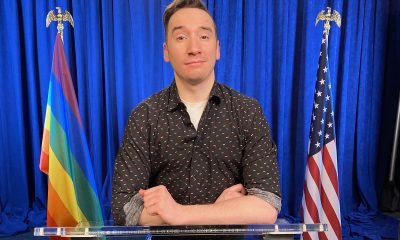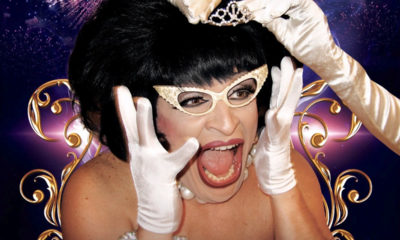Arts & Entertainment
Drama queens
Logo’s ‘A-List’ returns Monday; cast dishes on Reichen’s full-frontal pics, ‘evil’ Austin; Crews follow cast six days per week

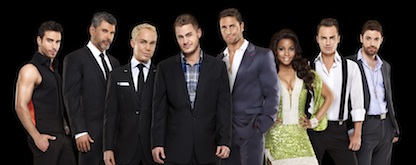
The cast of Logo’s ‘A List: New York’s’ second season, which returns Monday night. From left are Rodiney Santiago, Mike Ruiz, Ryan Nickulas, Austin Armacost, Reichen Lehmkuhl, Nyasha Zimucha, Derek Saathoff and TJ Kelly. (Photo courtesy of Logo)
It’s the show gays love — and love to hate. But many, of course, end up watching anyway.
TV’s gayest, guiltiest pleasure — even its creators embrace the “guilty pleasure” label — is back. “A List: New York’s” second season debuts Monday at 10 p.m. on Logo. The entire season one cast returns for 11 new episodes, this time with a gal pal in tow. The Blade spoke with the cast and crew to get the lowdown on the new season, find out what it’s like shooting the controversial series and ponder the show’s appeal.
The reality show, from the same people (True Entertainment) who brought “Real Housewives of Atlanta” to the air, debuted last October and follows the lives of five gay (and one bi; six total) men in New York who claim they’re at the top of the Manhattan social totem pole through their lives, loves and career ventures. Reality show vet Reichen Lehmkuhl (he won the fourth season of “Amazing Race” and formerly dated Lance Bass) unofficially heads the cast. A central theme of the first season was his tempestuous relationship with Brazilian model Rodiney Santiago, with troublemaker Austin Armacost never missing an opportunity to keep their social pot stirred.
It was a hit and helped, along with “RuPaul’s Drag Race,” put Logo, which debuted in 2005, on the pop culture map. The channel, owned by Viacom’s MTV Networks, won’t release ratings for the show but says it’s the second-highest rated show in the gay channel’s history (after “Drag Race”). A Dallas-based spin-off is planned for a fall debut.
The show’s reception has been wildly mixed. Some reviewers and fans say it’s great to see a gay-centric reality show instead of a mainstream show with token gay characters. Others have been appalled at what they say is a superficial and stereotype-laden cringe fest. Still others agree with that assessment but admit it’s well constructed and addictive.
Executive producer Dominic Pupa, who’s gay, says the show is “absolutely” a guilty pleasure and says the critical drubbing doesn’t mean it’s not successful at what its creators are aiming for.
“People roll their eyes all the time, but it captures people’s attention because it’s three things — people with means and access who live in New York. That trifecta of factors means it’s fascinating to watch. There’s something fun about people who are of means and do have access and discovering their lives can be just as exciting, dramatic and disappointing as yours. Plus it’s an ensemble show and people love ensembles because they can pick their favorite and tune in to see how they’re faring. Even the ones people hate — I hate to say character because it’s reality, but in the sense of being a dramatic narrative, they do sort of become characters — you still love to watch the ones you hate.”
Reichen, during a gym break (it’s legs-and-shoulders day; he goes seven days a week), says he learned early on to let go of the naysayers. It was also hard, he says, watching the first season and seeing how much was left out that would have added context to some of the less-flattering scenes.
“I used to read the blogs but then half way through, I stopped. I got rid of my Google alert and I have become a much happier person,” he says. “I kind of live in my own world. There were so many comments about my relationship with Rodiney, they said I didn’t care about him, I just brought him here and dropped him, but the truth is I made sure he had everything he needed and every opportunity he wanted and you know got him on his feet so he could pursue the stuff he wanted to do. It was such a slap in the face to watch this kind of play out in a very one-sided way … Rodiney knew it too. He was like, ‘Oh my god, he tried his best and Reichen’s not like that with me at all.’”
Letting go of the negative energy has centered Reichen in other ways, he says. It helped him shrug off the full frontal nude photos that surfaced recently of him. He admitted the photos — shot from the neck down — are of him.
“If that had happened five years ago, I think I would have shut myself into a mental institution,” he says. “But now my skin is so thick, I knew as soon as they surfaced, there would be every possible reaction. People would make fun of me, they would hate me, some people would like them — you just get to a point where you can deal with it whether it’s good or bad. It totally sucks that they surfaced without my permission — it was supposed to be a private thing, not something I broadcast for the whole world … but I wasn’t gonna pull an Anthony Wiener and lie about it. I was like, ‘Yeah, it’s me, go ahead and start shooting your arrows and let’s get it over with.’ I did mention that a lot of gay men do this kind of thing. I don’t feel I did anything immoral or illegal. It just so happens that because it was me, people cared.”
Rodiney agrees the show complicated their dating life and admits he was naïve about what he was getting into when he signed on.
“Last year was not easy for me,” he says. “It was very intense. It’s like I do the show and I forget I have the cameras with me but it’s who I am and they’re shooting me. There were a lot of difficult people who liked to create drama in my life. I’m the kind of person who just wants to live my life and not worry about somebody else’s life.”
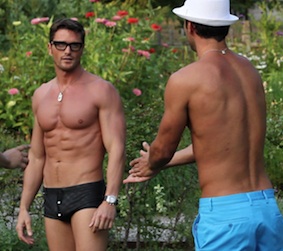
Reichen Lehmkuh (left) and his then-boyfriend Rodiney Santiago in a scene from the show’s first season. (Photo courtesy of Logo)
The couple broke up in November, shortly after the first season started airing. Rodiney admits the show was a factor. Might they still be together without “A-List”?
“I’d say it was half and half,” he says. “The show helped us to break up. We started to date and moved to New York together just six months into the relationship. It was very stressful for us. I can’t handle that.”
Reichen says he and Rodiney are now “friends in the best way possible” and says the second season has been much easier to shoot since he’s not in a relationship.
“It’s been more focused on my business ventures,” he says. “When it comes to the drama, I’ve been off the pedestal in the best way possible.”
New this season is 25-year-old Nyasha Zimucha, a straight entrepreneur and mega-achiever who runs her own business, hair-and-wig shop Embrace Your Hair. She was previously a judge on Little Miss Perfect. She’s a native of South Africa and came to the United States in 2001. She’s been in New York three years and knew “A-List”-er Mike Ruiz before joining the cast.
She says her presence adds an interesting punch to the new season.
“I think you’re going to be very entertained at how some of these relationships develop, both positive and negative,” she says. “It’s an interesting mix. Here you have this straight black girl with these six white, very handsome, very accomplished gay men. I think it’s historic because there’s really been nothing like it on television. You’re going to see not just the fights but the fun too, and I think that will be fun for the audience.”
The second season is still taping even as its first episodes are set to air. Three are fully edited and in the can. Pupa says he doesn’t know how long they’ll shoot — until he feels they have enough footage to bring the storylines to a sensible conclusion.
So how organic or contrived are the scenarios and does editing, obviously a necessity, sometimes distort the narrative?
“Like on any show, we like there to be a beginning, a middle and an end,” Pupa says. “You want to see the cast members start somewhere and end somewhere else. For each one it’s different. Last season we were still shooting until 10 days before the last episode, which is really unusual for this type of show … but it’s a lot more real than people think. They think it’s all very planned out but it’s really not. We ended last season with an argument between Austin and Reichen. That happened less than two weeks before it aired.”
None of the participants were contractually obligated to return for the second season. And the producers don’t tell them they have to meet with certain people or attend certain events. They take suggestions, though, and say they want to do their part to make the show as compelling as possible.
“It’s a nice relationship with cast and production,” Reichen says. “We all understand the result is trying to create something that people will want to watch.”
Camera crews follow cast members six days per week for about 10 hours each day when the show is shooting. Pupa says the cast does its best to schedule things more likely to be interesting when the show is shooting and save the boring stuff — like meeting with lawyers for their business ventures — off-camera. Reichen, for instance, says he traveled much of the six months between the two seasons, though he did see all the cast members at least once during that time, most often at charity events, which he says draw little media attention. He guesses he was only in New York for about 60 days of that six months. He’s been busy prepping a new book and getting ready to launch a fragrance line.
Often the best moments happen when the full cast is together.
“That’s when we have the greatest dynamic,” Pupa says. “Everybody loves Ryan. If he’s throwing a party, you know the whole cast will be there. If Austin throws a party, we don’t know who will walk through the door.”
And what about Austin — is he really the troublemaker he seemed to be from season one?
Reichen says there’s “some stuff” between them that goes down in season two. “You’ll just have to watch,” he says.
Rodiney has a tougher assessment.
“I don’t trust him and we cannot be friends,” he says. “He’s the kind of person I want him far away from my life. He’s evil and he does crazy stuff and I don’t want him part of my life.”
Pupa says Austin is reality’s answer to characters like Alexis and J.R.
“The golden rule of docu soap TV is that just because someone is hated doesn’t mean they’re not watchable,” he says. “It’s a Joan Collins thing for sure. Sometimes you don’t want to admit to liking Austin, but you love watching him.”
Nyasha says the title is a bit of a misnomer and says the show ultimately works because it’s real and people from all walks of life can relate.
“What it’s really about is interesting, dynamic people living in New York,” she says. “Some have great careers and some ain’t doing nothing, but it unfolds as great TV because it’s honest. Even a young straight woman can relate to this or that. Some might think, ‘I don’t relate, what the hell am I doing watching this crap?’ but any level of negative is part of the drama of any relationship and there’s not one person who doesn’t have some level of drama. If there is, give me their number. … It’s just heightened because it’s on TV.”
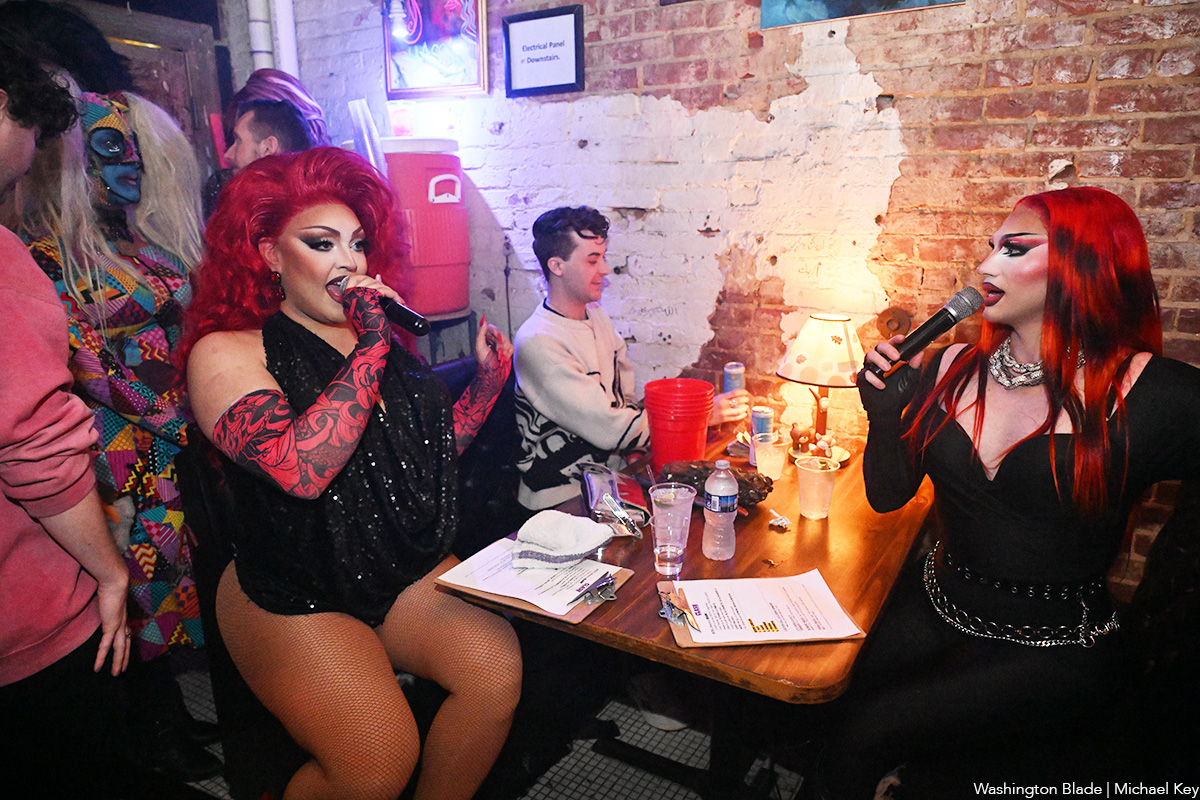
Crimsyn and Tatianna hosted the new weekly drag show Clash at Trade (1410 14th Street, N.W.) on Feb. 14, 2026. Performers included Aave, Crimsyn, Desiree Dik, and Tatianna.
(Washington Blade photos by Michael Key)
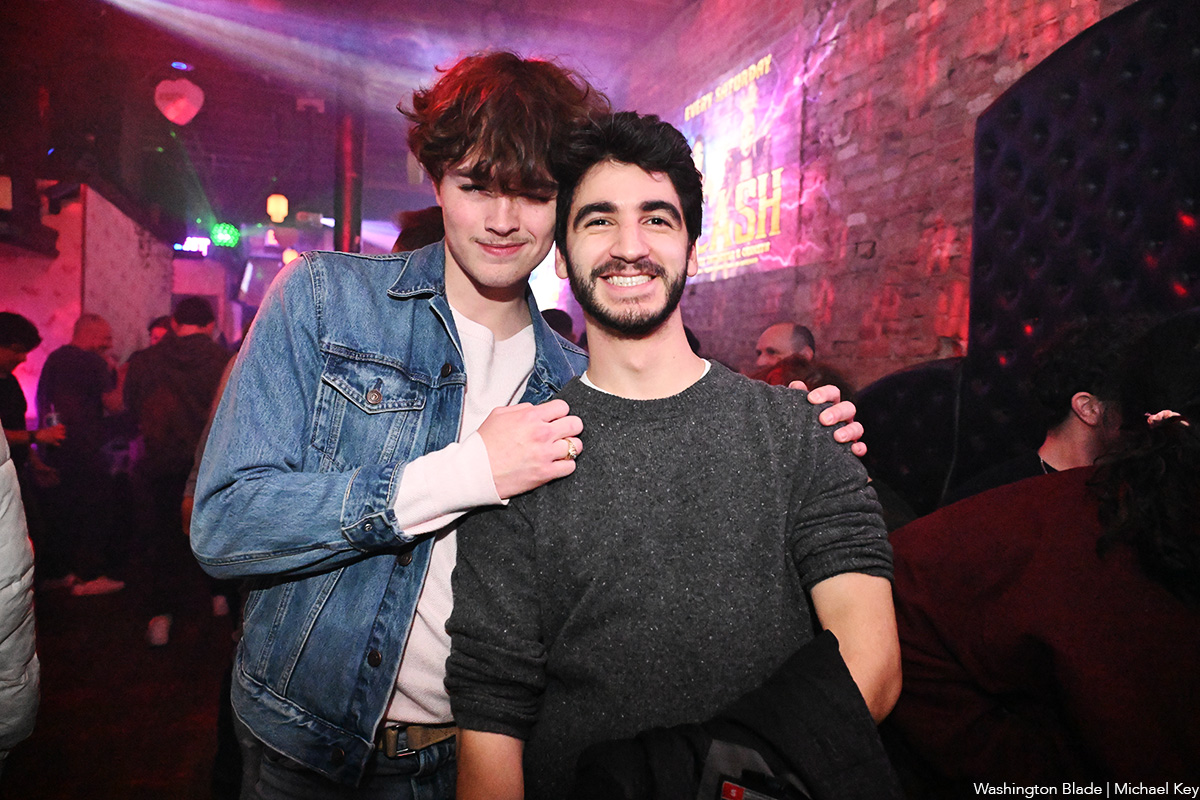
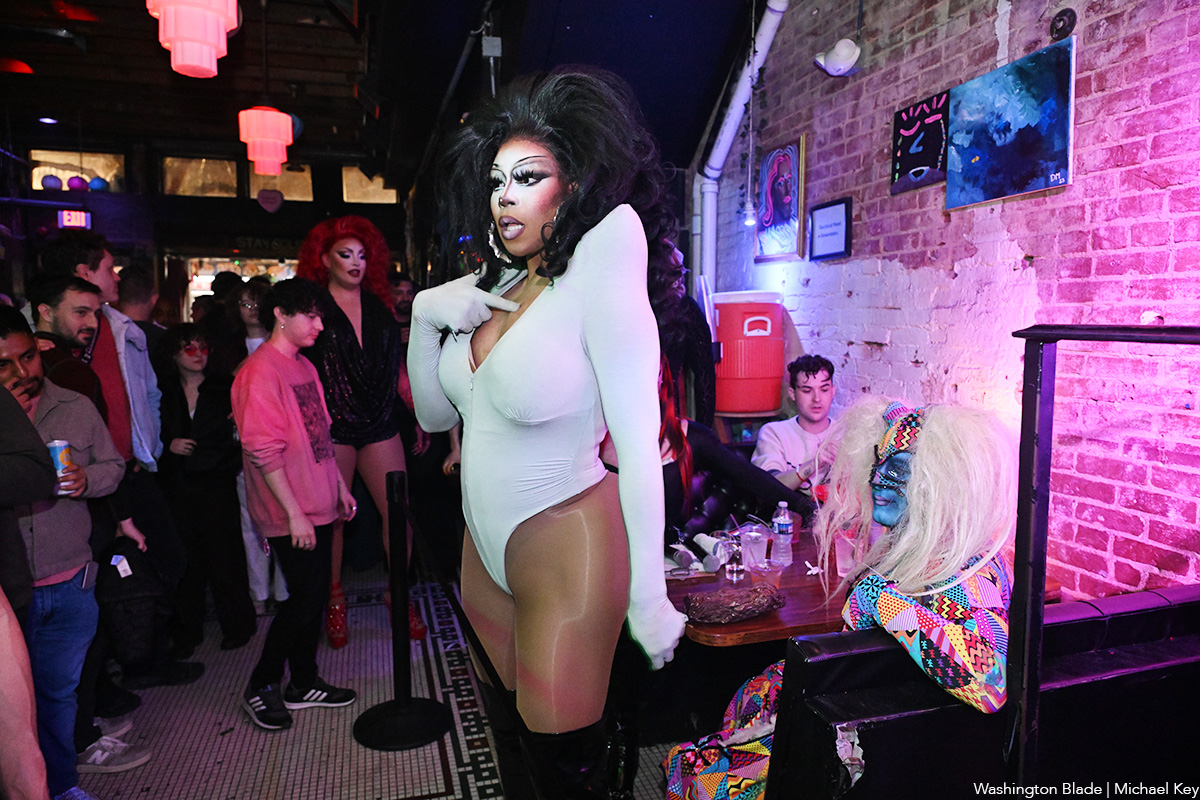
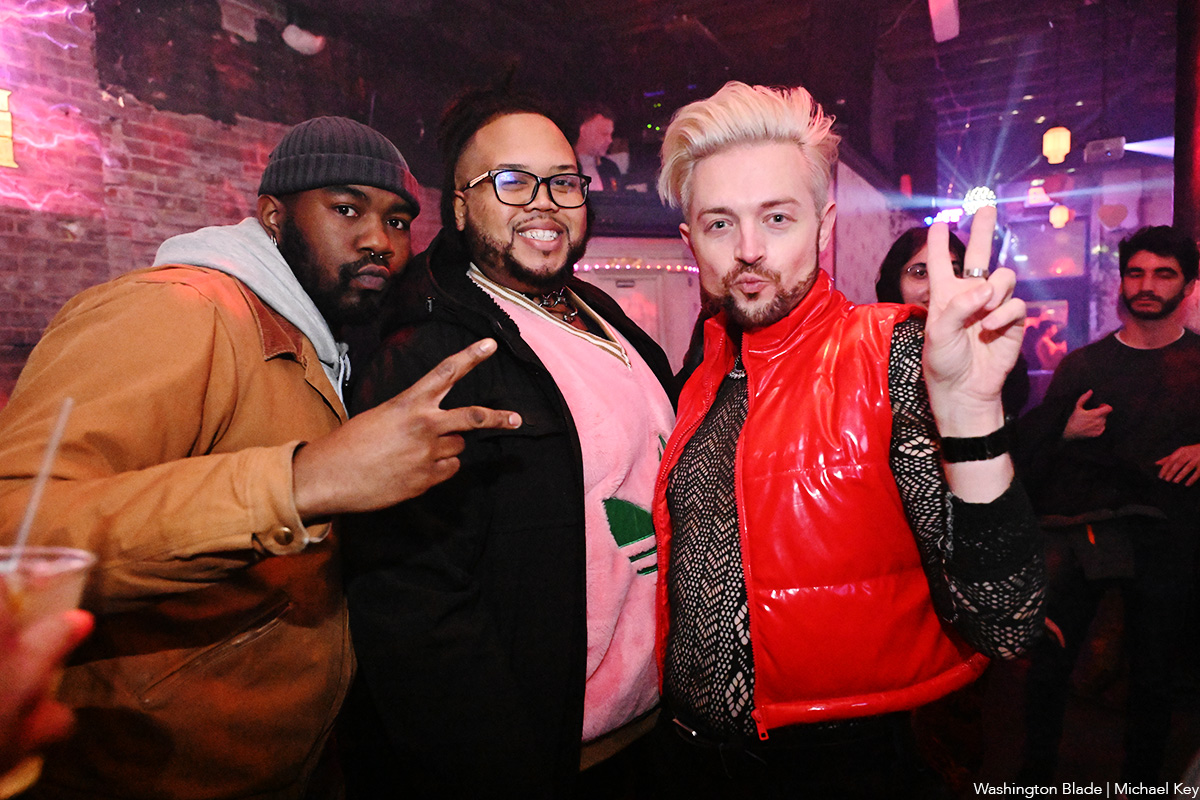
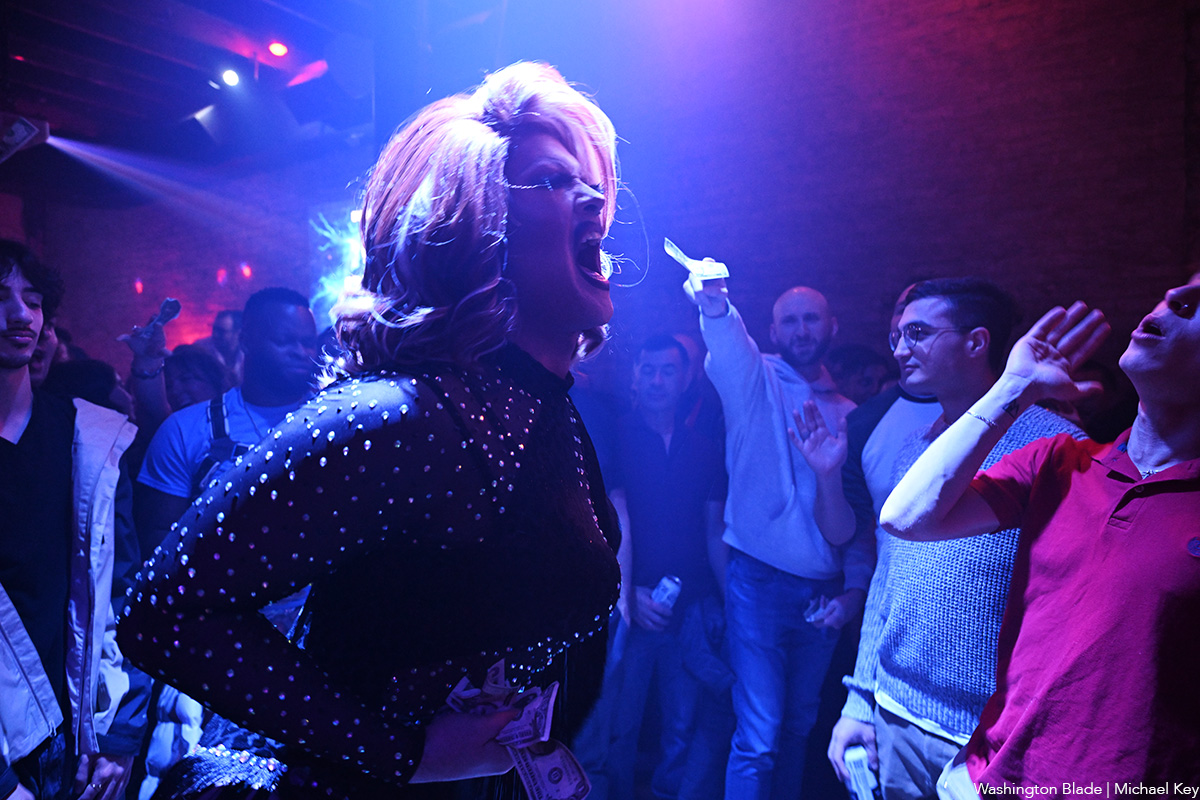
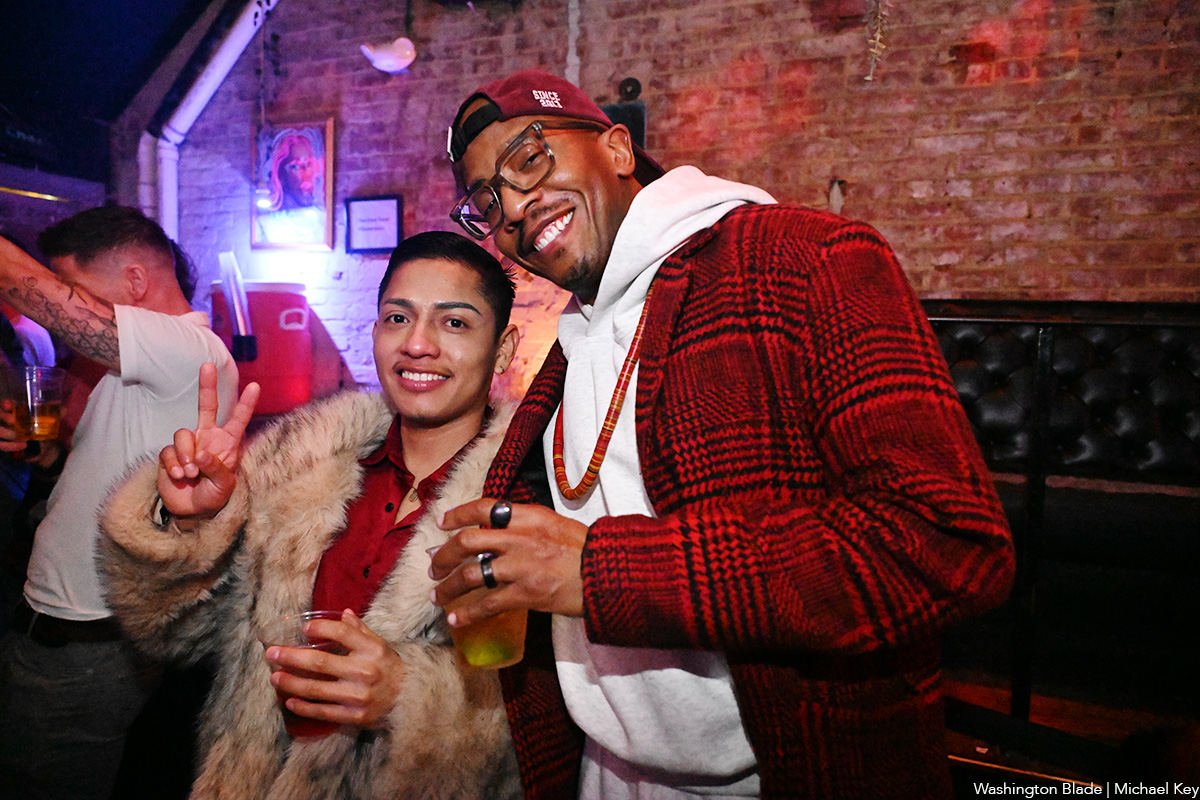
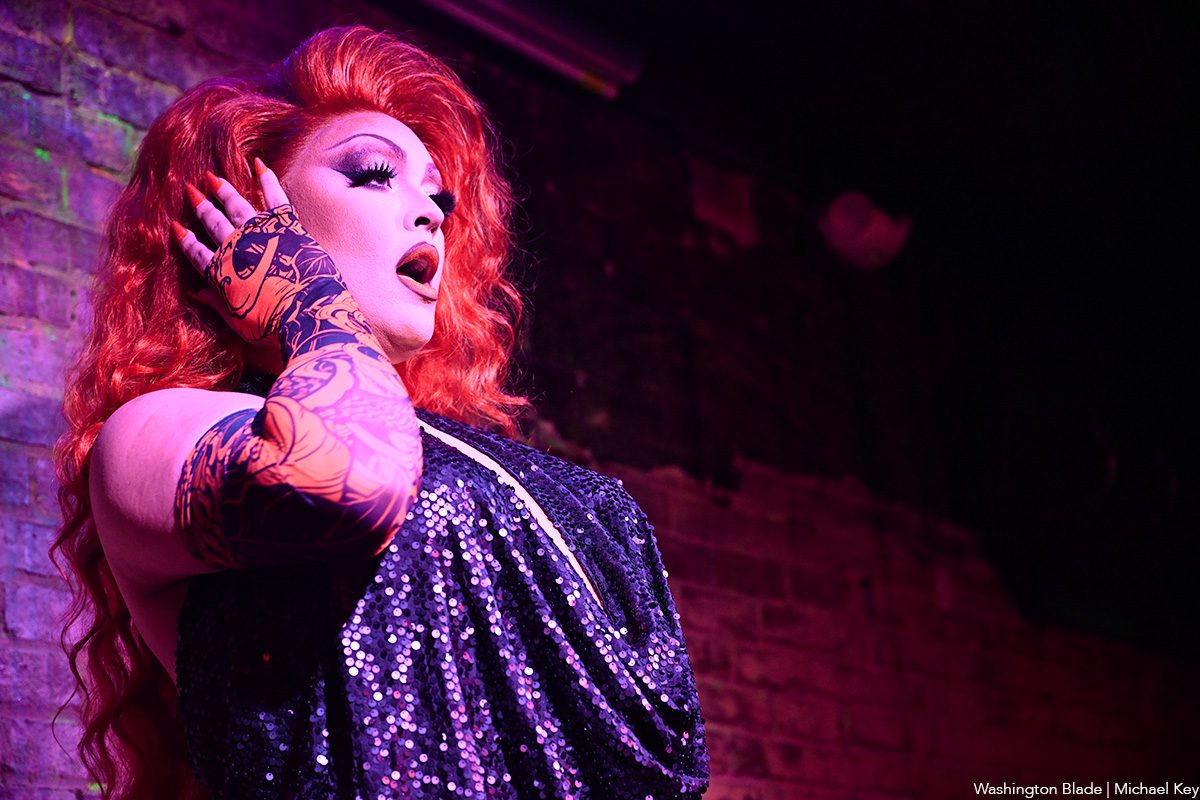
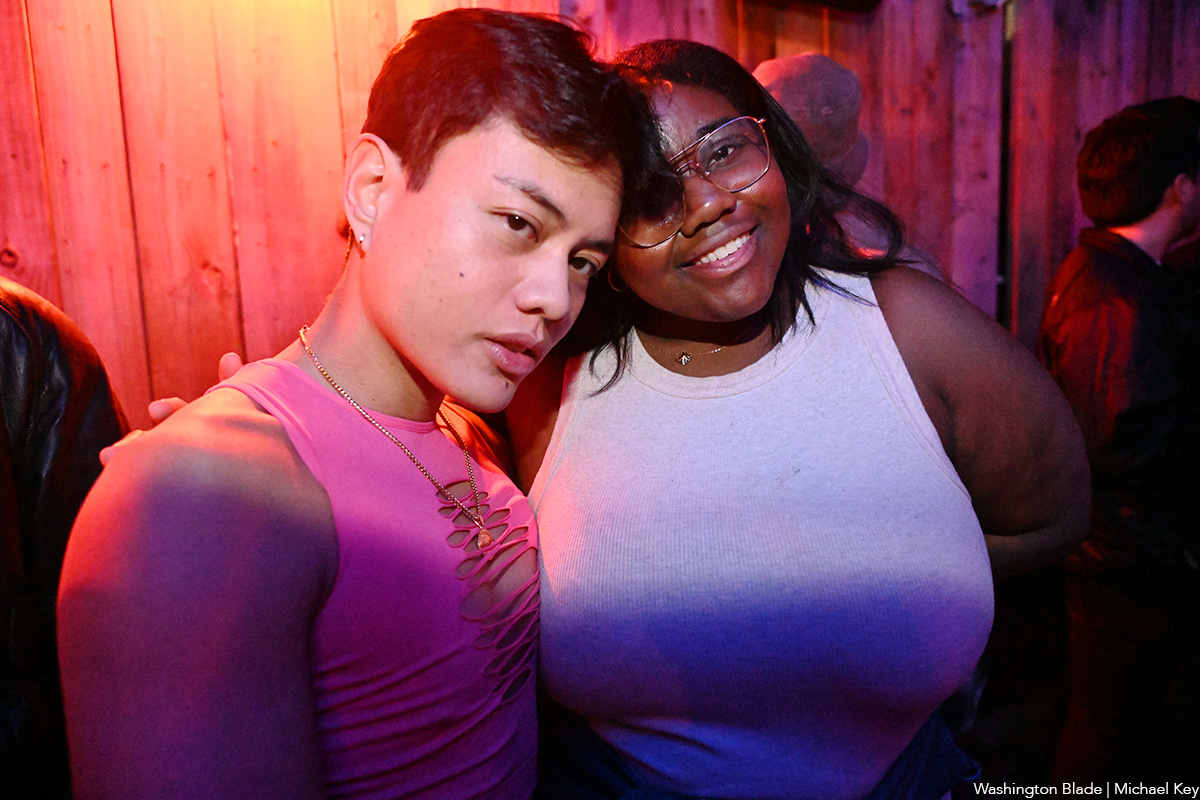
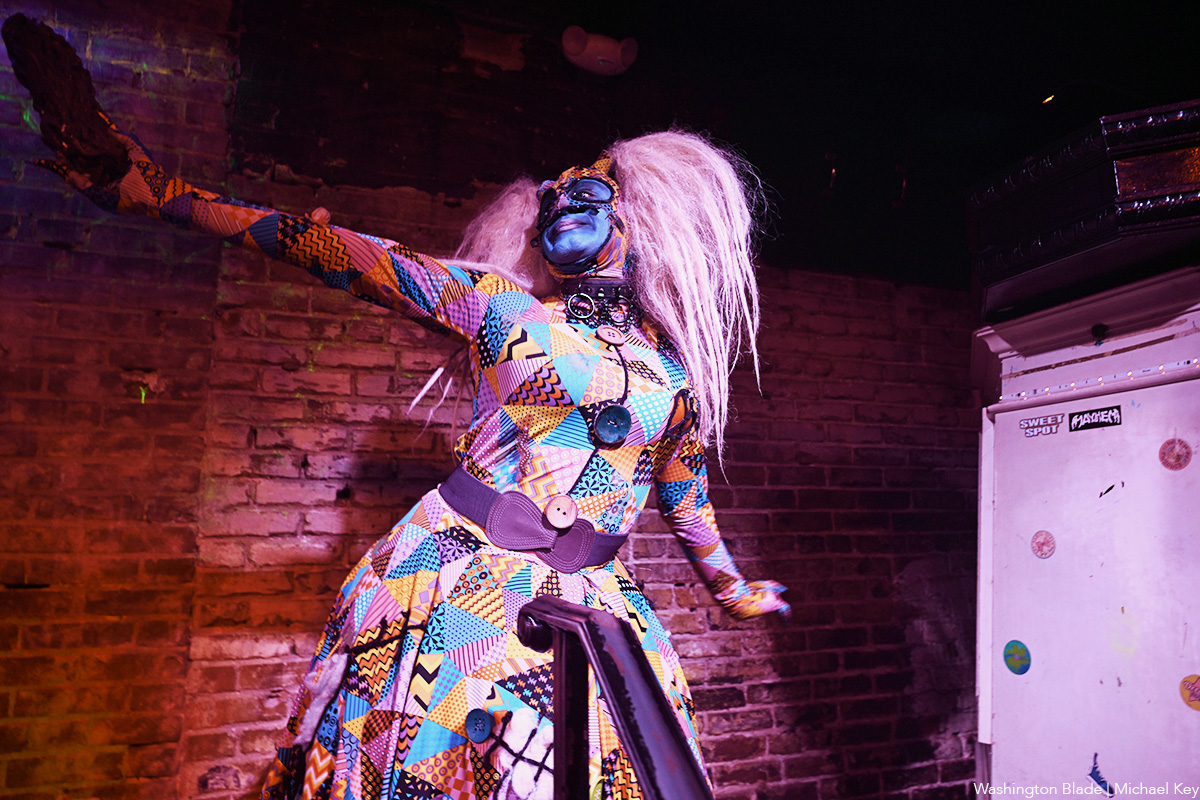
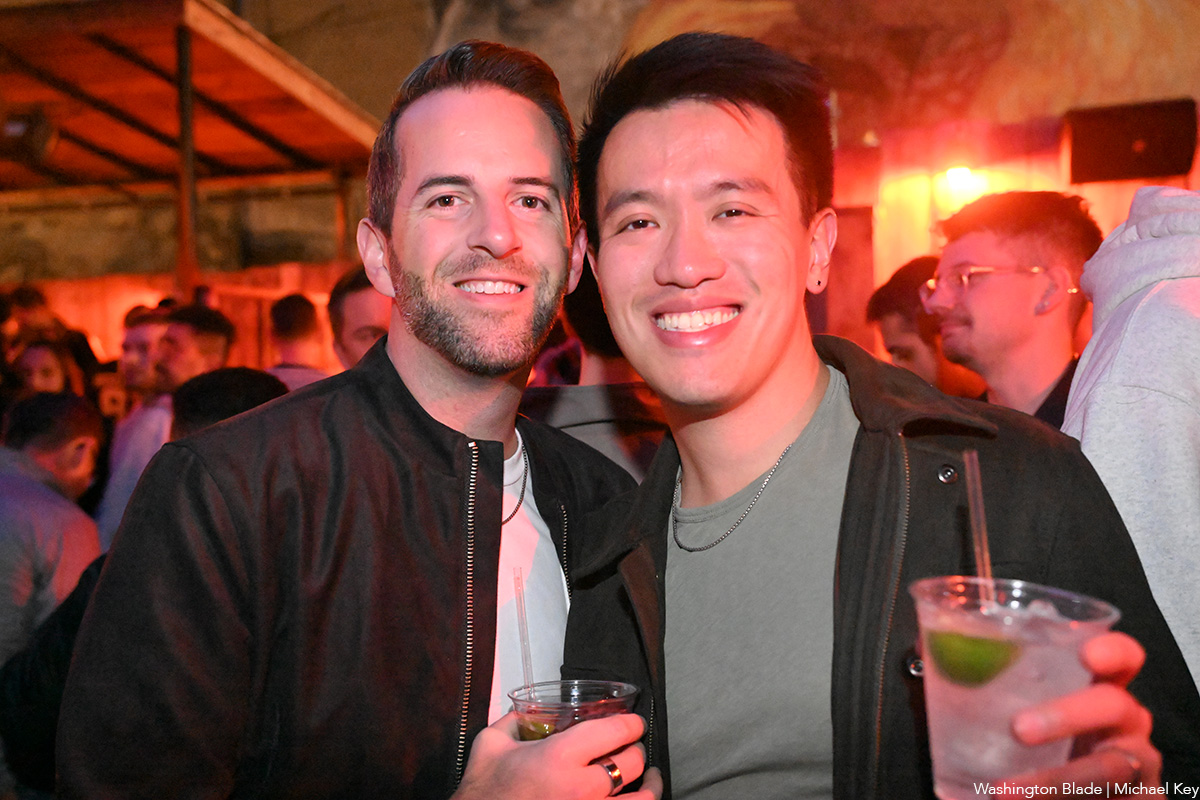
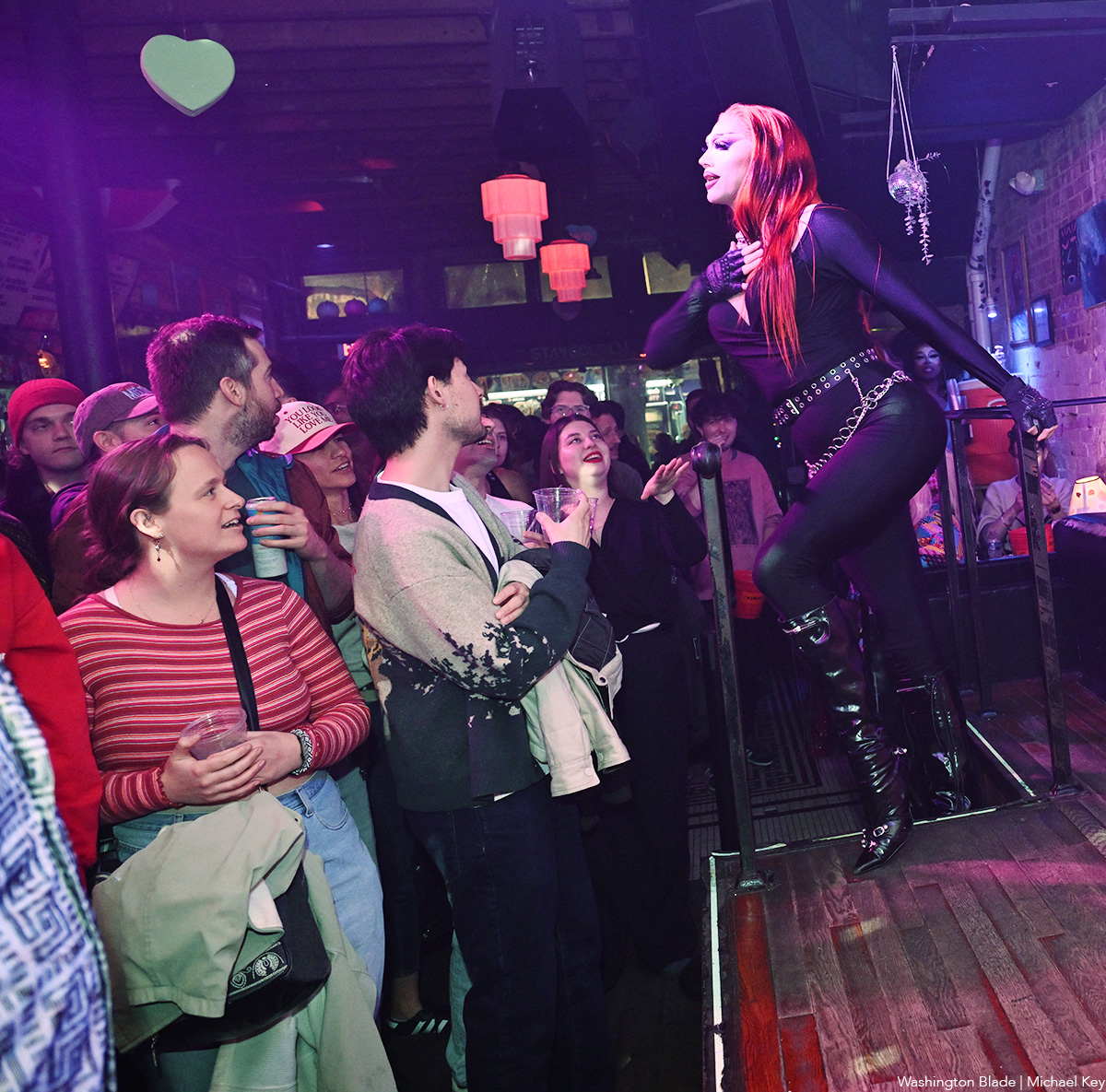
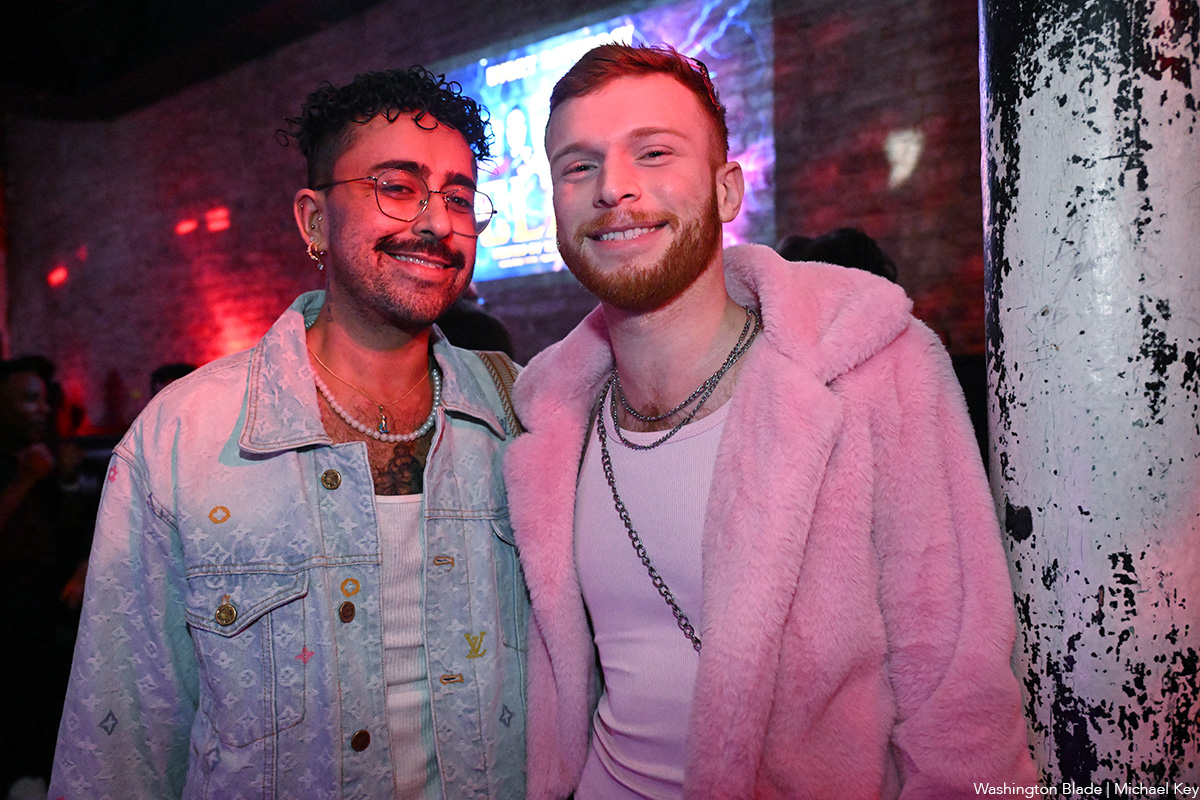
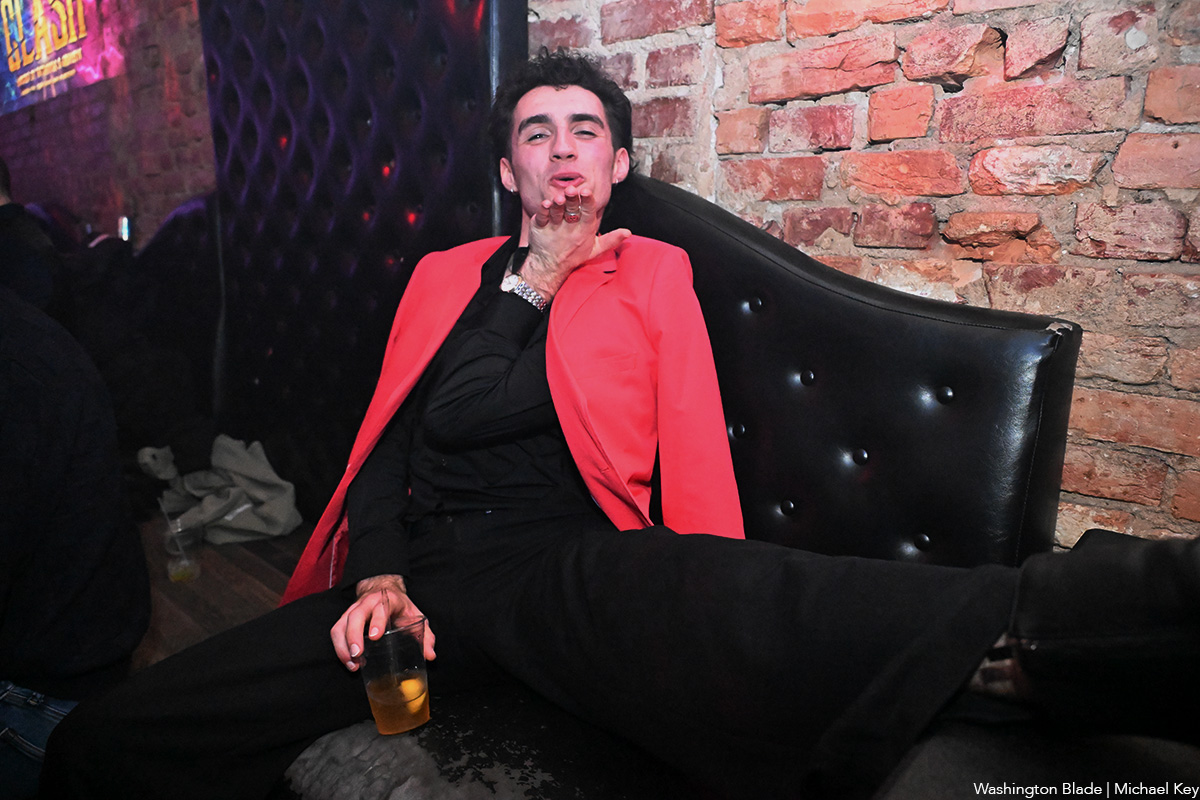
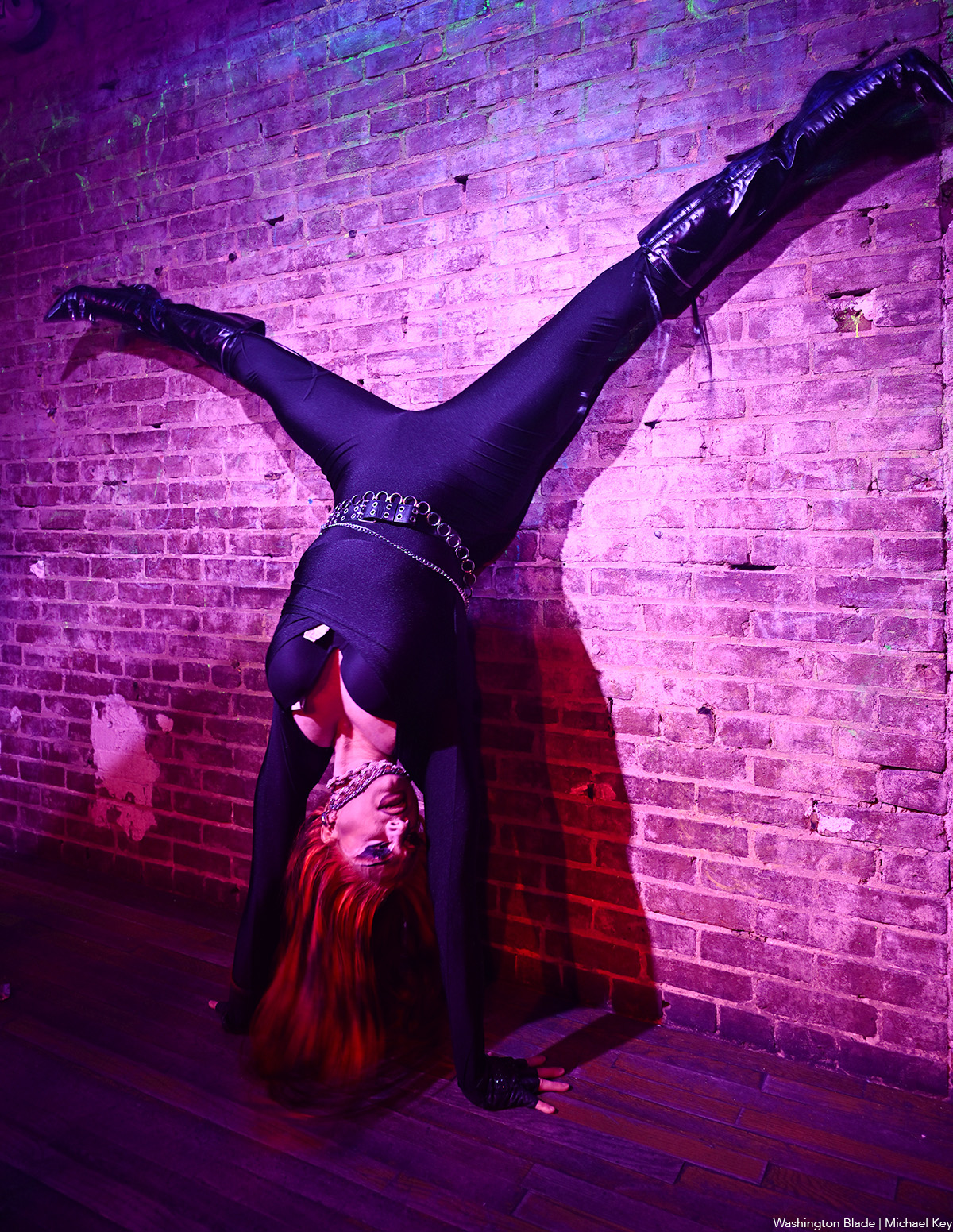
Theater
Magic is happening for Round House’s out stage manager
Carrie Edick talks long hours, intricacies of ‘Nothing Up My Sleeve’

‘Nothing Up My Sleeve’
Through March 15
Round House Theatre
4545 East-West Highway
Bethesda, Md. 20814
Tickets start at $50
Roundhousetheatre.org
Magic is happening for out stage manager Carrie Edick.
Working on Round House Theatre’s production of “Nothing Up My Sleeve,” Edick quickly learned the ways of magicians, their tricks, and all about the code of honor among those who are privy to their secrets.
The trick-filled, one-man show starring master illusionist Dendy and staged by celebrated director Aaron Posner, is part exciting magic act and part deeply personal journey. The new work promises “captivating storytelling, audience interaction, jaw-dropping tricks, and mind-bending surprises.”
Early in rehearsals, there was talk of signing a non-disclosure agreement (NDA) for production assistants. It didn’t happen, and it wasn’t necessary, explains Edick, 26. “By not having an NDA, Dendy shows a lot of trust in us, and that makes me want to keep the secrets even more.
“Magic is Dendy’s livelihood. He’s sharing a lot and trusting a lot; in return we do the best we can to support him and a large part of that includes keeping his secrets.”
As a production assistant (think assistant stage manager), Edick strives to make things move as smoothly as possible. While she acknowledges perfection is impossible and theater is about storytelling, her pursuit of exactness involves countless checklists and triple checks, again and again. Six day weeks and long hours are common. Stage managers are the first to arrive and last to leave.
This season has been a lot about learning, adds Edick. With “The Inheritance” at Round House (a 22-week long contract), she learned how to do a show in rep which meant changing from Part One to Part Two very quickly; “In Clay” at Signature Theatre introduced her to pottery; and now with “Nothing Up My Sleeve,” she’s undergoing a crash course in magic.
She compares her career to a never-ending education: “Stage managers possess a broad skillset and that makes us that much more malleable and ready to attack the next project. With some productions it hurts my heart a little bit to let it go, but usually I’m ready for something new.”
For Edick, theater is community. (Growing up in Maryland, she was a shy kid whose parents signed her up for theater classes.) Now that community is the DMV theater scene and she considers Round House her artistic home. It’s where she works in different capacities, and it’s the venue in which she and actor/playwright Olivia Luzquinos chose to be married in 2024.
Edick came out in middle school around the time of her bat mitzvah. It’s also around the same time she began stage managing. Throughout high school she was the resident stage manager for student productions, and also successfully participated in county and statewide stage management competitions which led to a scholarship at the University of Maryland, Baltimore County (UMBC) where she focused on technical theater studies.
Edick has always been clear about what she wants. At an early age she mapped out a theater trajectory. Her first professional gig was “Tuesdays with Morrie” at Theatre J in 2021. She’s worked consistently ever since.
Stage managing pays the bills but her resume also includes directing and intimacy choreography (a creative and technical process for creating physical and emotional intimacy on stage). She names Pulitzer Prize winning lesbian playwright Paula Vogel among her favorite artists, and places intimacy choreographing Vogel’s “How I learned to Drive” high on the artistic bucket list.
“To me that play is heightened art that has to do with a lot of triggering content that can be made very beautiful while being built to make you feel uncomfortable; it’s what I love about theater.”
For now, “Nothing Up My Sleeve” keeps Edick more than busy: “For one magic trick, we have to set up 100 needles.”
Ultimately, she says “For stage managers, the show should stay the same each night. What changes are audiences and the energy they bring.”

Friday, February 13
Center Aging Monthly Luncheon With Yoga will be at noon at the DC Center for the LGBT Community. Email Mac at [email protected] if you require ASL interpreter assistance, have any dietary restrictions, or questions about this event.
Go Gay DC will host “LGBTQ+ Community Happy Hour Meetup” at 7 p.m. at Freddie’s Beach Bar and Restaurant. This is a chance to relax, make new friends, and enjoy happy hour specials at this classic retro venue. Attendance is free and more details are available on Eventbrite.
Women in their Twenties and Thirties will be at 7 p.m. on Zoom. This is a social discussion group for queer women in the D.C. area. For more details, visit the group on Facebook.
Saturday, February 14
Go Gay DC will host “LGBTQ+ Community Brunch” at 11 a.m. at Freddie’s Beach Bar & Restaurant. This fun weekly event brings the DMV area LGBTQ community, including allies, together for delicious food and conversation. Attendance is free and more details are available on Eventbrite.
The DC Center for the LGBT Community will host a screening of “Love and Pride” at 1:30 p.m. This event is a joy-filled global streaming celebration honoring queer courage, Pride, and the power of love. It’s a bold celebration of courage and community — a fearless reminder of what we’ve overcome, how love is what makes us unstoppable, and how we have always turned fear into fierce. For more details, visit the Center’s website.
Sunday, February 15
LGBTQ+ Community Coffee and Conversation will be at 12 p.m. at As You Are. This event is for people looking to make more friends and meaningful connections in the LGBTQ community. Attendance is free and more details are available on Eventbrite.
Monday, February 16
Queer Book Club will be at 7:00p.m. on Zoom. This month’s read is “Faebound” by Saara El-Arifi. For more details, visit the DC Center’s website.
“Center Aging: Monday Coffee Klatch” will be at 10 a.m. on Zoom. This is a social hour for older LGBTQ+ adults. Guests are encouraged to bring a beverage of choice. For more information, contact Adam ([email protected]).
Tuesday, February 17
Center Bi+ Roundtable will be at 7 p.m. on Zoom. This is an opportunity for people to gather in order to discuss issues related to bisexuality or as Bi individuals in a private setting.Visit Facebook or Meetup for more information.
Wednesday, February 18
Job Club will be at 6 p.m. on Zoom upon request. This is a weekly job support program to help job entrants and seekers, including the long-term unemployed, improve self-confidence, motivation, resilience and productivity for effective job searches and networking — allowing participants to move away from being merely “applicants” toward being “candidates.” For more information, email [email protected] or visit thedccenter.org/careers.
Thursday, February 19
The DC Center’s Fresh Produce Program will be held all day at the DC Center for the LGBT Community. To be fair with who is receiving boxes, the program is moving to a lottery system. People will be informed on Wednesday at 5 p.m. if they are picked to receive a produce box. No proof of residency or income is required. For more information, email [email protected] or call 202-682-2245.
Virtual Yoga Class will be at 7 p.m. on Zoom. This free weekly class is a combination of yoga, breath work and meditation that allows LGBTQ+ community members to continue their healing journey with somatic and mindfulness practices. For more details, visit the DC Center’s website.



